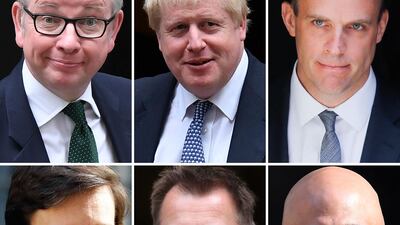Five Conservative contenders vying to replace British Prime Minister Theresa May next month clashed over Brexit in a leadership debate on UK television on Sunday evening.
There was a notable absence. The favourite, Boris Johnson, said he did not want to take part because it would be "cacophonous" having so many candidates debating.
The Channel Four debate featured Michael Gove, Jeremy Hunt, Sajid Javid, Dominic Raab and Rory Stewart arguing views on Brexit and domestic issues such as health care and crime.
The MPs present were quick to criticise Mr Johnson for failing to show.
“I just want to say: where is Boris?" said Mr Hunt, who is second favourite.
"If his team won’t let him out to debate with five pretty friendly colleagues, how is he going to get on with 27 European colleagues?
"He should be here to answer that very question."
Mr Stewart said he hoped that one of the politicians present at the debate would become the next prime minister.
The centre-right candidate, who opposes a no-deal Brexit, seemed to win the most applause from the audience.
But the odds that Mr Stewart will win the leadership race remain low because he is not a favourite of Conservative Party members.
He criticised the “machismo” of the debate, saying that being tougher on Europe would not make the bloc more amenable to concessions for Britain.
Mr Gove was initially one of the favourites to succeed the departing prime minister, but he damaged his chances by acknowledging that he used cocaine several times two decades ago.
During the debate, MPs were quick to defend him for his actions after he apologised and said the decision was a mistake.
“We should not be trivialising this debate by talking about what we got up to 25 years ago,” Mr Hunt.
Mr Raab, who backs a hard, no-deal Brexit, said he was the only person in the debate who would be prepared to suspend parliament to stop a deadlock blocking the UK from leaving the EU with no deal.
“I’m 100 per cent committed to keeping the promise to the voters of this country," he said.
"This leadership contest is an issue of trust and I think I’m the only one who could be trusted to get us out in October."
Home Secretary Mr Javid criticised Mr Raab's view on suspending parliament.
"We are not selecting a dictator of this country," he said. "We are choosing a prime minister of this country. You don’t deliver on democracy by trashing democracy."
Mr Javid said Mrs May made a fundamental mistake of not adequately preparing for a no-deal scenario.
He said the UK must agree to offer additional benefits to Europe if it wants to renegotiate the Brexit deal.
“You’ve got to change something," Mr Javid said. "You could offer to pay all costs of the Irish border and alternative arrangements – that will change the mood music."
But Mr Hunt said Britain should go back to the negotiating table to give voters more of a choice.
“We have to sit down and negotiate that deal and say that it’s fundamentally pessimistic if we can’t do that, because it means we are giving the country the stark choice of a deal, or no-deal, or no Brexit.”
More debates are due to take place this week to whittle down the leadership contenders to two.

